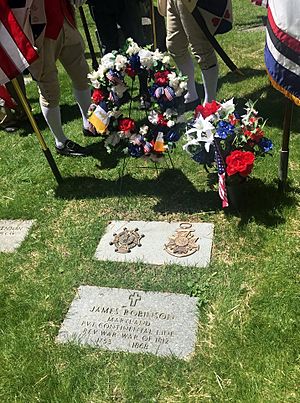James Robinson (soldier, born 1753) facts for kids
Quick facts for kids
Rev. James Robinson
|
|
|---|---|
| Birth name | James Robinson |
| Nickname(s) | Old Father Robinson |
| Born | March 21, 1753 Eastern Shore of Maryland |
| Died | March 27, 1868 (aged 115) Detroit, Michigan |
| Buried |
Elmwood Cemetery, Detroit
(42°20′50″N 83°01′02″W / 42.3472486°N 83.0171011°W) |
| Allegiance | |
| Service/ |
|
| Rank | Private |
| Battles/wars | American Revolutionary War • Battle of Brandywine • Siege of Yorktown War of 1812 • Battle of New Orleans |
| Awards | Gold Medal of Valor ( |
| Spouse(s) | Curtilda |
| Children | Alexander, Wesley Sr. |
Rev. James Robinson (1753–1868) was a brave African American soldier who fought in two major American wars. He was born on March 21, 1753, in Maryland, at a time when many Black people were forced into slavery. James Robinson served under famous generals like Gilbert du Motier, Marquis de Lafayette and became a very important soldier in the American Revolutionary War.
Contents
Fighting for Freedom: The Revolutionary War
James Robinson was 24 years old when his owner, Francis De Shields, made him join the army. He was promised his freedom if he fought. Robinson joined a Virginia Light Infantry Regiment. His group was one of several African American regiments. They served under the French General Gilbert du Motier, Marquis de Lafayette.
Robinson fought in many battles. One was the Battle of Brandywine, which the British won. He also fought in places like White Haven and Cambridge. At the Siege of Yorktown, he showed incredible bravery. He led a charge up a British wall and defeated three British soldiers by himself!
General Lafayette was so impressed by Robinson's actions. He personally gave Robinson a Gold Medal of Valor. This made James Robinson the most honored African American soldier of the Revolutionary War. Between 5,000 and 10,000 African Americans fought for America in this war.
The War of 1812: A New Fight
After the Revolutionary War, Francis De Shields broke his promise. He did not free Robinson. Instead, he sold him into slavery again in New Orleans, Louisiana. Robinson's new owner was Calvin Smith. Robinson said Smith was very harsh. Smith made Robinson serve in the War of 1812.
In 1813, General Andrew Jackson arrived to gather soldiers. They needed to stop the British during what became the Battle of New Orleans. During one fight, Robinson was shot and lost a finger. He was also hit in the head with a sword, leaving a scar he carried his whole life.
After the American victory, General Jackson told the soldiers that the enslaved people who fought would not be freed. Robinson felt a strong sense of injustice and anger at this news.
Life After Slavery
James Robinson finally gained his freedom in the 1830s. He then became an ordained minister. In the 1840s and 1850s, he lived in Butler County, Ohio, with his wife, Curtilda. They had two sons, Alexander and Wesley Sr. His son, Wesley, later fought in the American Civil War with the 102nd United States Colored Infantry Regiment.
By 1860, Robinson and his family were living in Detroit. Robinson wrote a book about his life called James Roberts (slave narrative). He used a slightly different name for the book.
In 1825, Robinson met General Lafayette again. This was during Lafayette's return tour of the United States. James Robinson died in Detroit on March 27, 1868. He was 115 years old. Large crowds gathered for his funeral. He was the last living African American veteran of the Revolutionary War. He was also the oldest person buried in Elmwood Cemetery. His last known descendant was his granddaughter, Gertrude Robinson, who died in Ohio in 1983.
Honoring a Hero: Military Tributes
On June 22, 2019, a special ceremony was held at Elmwood Cemetery. This event honored James Robinson's military service. It was organized by groups like the Sons of the American Revolution and the General Society of the War of 1812. Military honors were given 151 years after his death. The American Legion helped with the ceremony.
Many important people spoke at the event. These included U.S. Representative Rashida Tlaib and Maj. Gen. Leonard Isabelle. Senator Gary Peters also sent a letter that was read aloud. Representative Tlaib had shared Robinson's achievements in the U.S. Congressional Record. She also gave a certificate to the National Mall Liberty Fund D.C. This group is working to build the National Liberty Memorial. This memorial will honor the important contributions of African Americans to American Independence.
 | DeHart Hubbard |
 | Wilma Rudolph |
 | Jesse Owens |
 | Jackie Joyner-Kersee |
 | Major Taylor |


